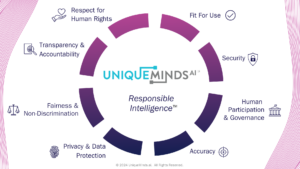AI governance is evolving rapidly, and the recent policy shifts at Anthropic serve as a reminder of just how fluid and reactionary this space can be. In a matter of days, Anthropic removed its commitments to bias mitigation and non-discrimination, only to reinstate them following public scrutiny. This back-and-forth raises important questions about the stability and reliability of AI policies, particularly for organizations that rely on AI-driven solutions.
The quick reversal of these policies underscores a larger issue in AI governance—the need for consistent, transparent, and accountable frameworks. AI companies must navigate a complex landscape of regulatory expectations, ethical considerations, and business interests, making it critical that their commitments to fairness, bias mitigation, and transparency are embedded deeply rather than adjusted based on external pressures. Whether through social media, news reports, or firsthand experiences, we’ve all been made aware of the “dark side of AI”, and it’s not pretty. When AI providers can make such abrupt changes, businesses, healthcare organizations, and other stakeholders are in a precarious position, forcing them to constantly monitor and adjust their AI reliance based on unpredictable corporate decisions.
This unpredictability is especially concerning in high-stakes industries like healthcare, where AI models influence patient outcomes, medical diagnostics, and treatment recommendations. If an AI system’s bias mitigation protocols are suddenly removed, models could be trained on uninclusive datasets, leading to disparities in healthcare solutions. This could result in AI-driven recommendations that disadvantage certain populations, misdiagnose conditions due to biased training data, or reinforce existing inequities in medical care. The unintended consequence? Patients could suffer from lower-quality care, delayed treatment, or even misinformed medical decisions.
AI can be an incredible tool, but it can also be a risky one if not properly managed, monitored, and governed. The Anthropic case exemplifies the dynamic and innovative albeit risky nature of the AI landscape, highlighting the need for organizations to have safeguards in place to ensure that their AI solutions remain ethical and aligned with human rights principles—regardless of changes at the provider level.
The Implications for Businesses Relying on AI
For businesses, healthcare providers, and other organizations integrating AI into their operations, this situation highlights a critical challenge: AI governance cannot be an afterthought. If your company, contractors, or employees are leveraging AI models like Claude, policy shifts of this nature could have direct consequences on your work. AI systems influence decision-making, automate processes, and, in some cases, interact with sensitive patient or customer data. A sudden policy change at the provider level could introduce risks to fairness, compliance, and transparency.
The core issue here is stability and trust in AI solutions. When governance policies fluctuate based on external pressures rather than being embedded as core principles, businesses are left navigating uncertainty. If AI providers can change course so quickly, how can organizations ensure that their AI implementations remain ethical, unbiased, and aligned with regulatory expectations?
Why the Responsible AI Framework for Healthcare (RAIFH™) is Essential
At UniqueMinds.AI, we believe that responsible AI governance should be proactive, not reactive. This is precisely why we developed the Responsible AI Framework for Healthcare (RAIFH)—to embed transparency, compliance, and human rights considerations into AI adoption from the very beginning.

RAIFH is designed to ensure that AI models and applications in healthcare (and beyond) adhere to ethical principles regardless of shifting external influences. It provides a structured approach to:
- Ensuring compliance with regulations and ethical guidelines, with fairness and non-discrimination embedded as core principles rather than reactive measures.
- Embedding transparency so stakeholders understand how AI-driven decisions are made, fostering accountability and trust in AI systems.
- Upholding human rights and non-discrimination as fundamental, unshakable principles, ensuring AI solutions respect dignity, fairness, and equitable treatment for all.
- Continuously monitoring AI behavior to ensure long-term accountability, preventing biases and reinforcing responsible governance over time.
AI Governance: A Call for Stability and Long-Term Commitment
The lesson from Anthropic’s policy reversal is clear: AI governance needs long-term stability, not reactionary adjustments. Ethical AI is not about checking a box or making commitments that can be quietly removed—it’s about a sustained, principled approach to responsible technology development and deployment. Organizations that adopt AI must do their due diligence to ensure that the solutions they rely on are aligned with ethical, regulatory, and operational needs.
As AI continues to advance and integrate into critical sectors like healthcare, businesses must stay ahead of governance shifts rather than react to them. RAIFH ensures that responsible AI is not an afterthought, but a foundation—one that organizations can trust to remain consistent and resilient amid industry changes.
Moving in Confidence with AI
AI governance is dynamic, and as Anthropic’s recent decisions demonstrate, even leading AI companies can make sudden policy shifts. This underscores why organizations need a structured, principle-driven approach to AI adoption—one remains steadfast in its commitment to ethical, fair, and responsible AI.
At UniqueMinds.AI, we are committed to ensuring that AI solutions respect human rights, promote transparency, and maintain compliance from day one and beyond. The future of AI isn’t just about technological advancement—it’s about ensuring that progress is guided by stable, ethical, and long-term governance.







